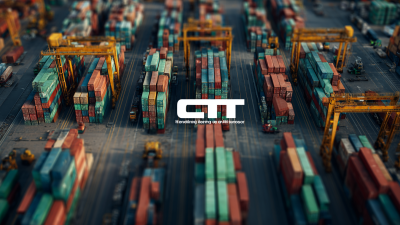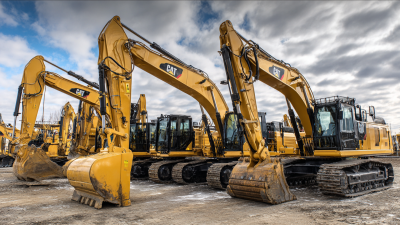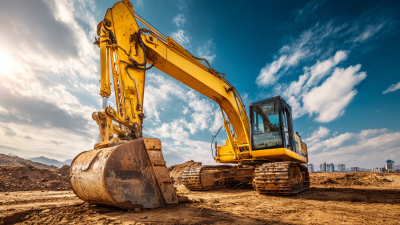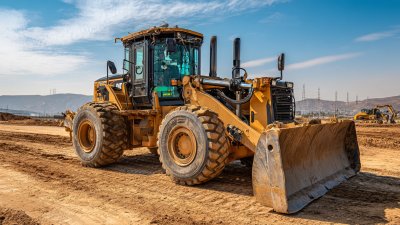Leave Your Message
- Phone
- E-mail
- Whatsapp
When it comes to acquiring heavy machinery for construction, mining, or agricultural purposes, selecting the right Heavy Equipment Trader is crucial for guaranteeing both efficiency and financial viability. According to a report by IBISWorld, the heavy equipment rental and leasing industry is projected to grow at an annual rate of 4.3% over the next five years, underscoring the increasing demand for reliable traders. A good Heavy Equipment Trader not only provides access to a diverse fleet of machinery but also offers valuable insights into market trends, equipment maintenance, and financing options.

As the industry evolves, understanding the unique needs of your projects and aligning them with a trader’s offerings can significantly impact operational success. This checklist aims to guide you through the essential factors to consider when choosing the right Heavy Equipment Trader, ensuring that your investment aligns with your operational goals.
 Choosing the right heavy equipment trader is crucial for meeting your construction needs effectively. With the global construction equipment market projected to grow from $171.98 billion in 2025 to $271.30 billion by 2032, exhibiting a CAGR of 6.73%, the stakes are high. When selecting a trader, consider their credibility and reputation within the industry, as a strong track record can indicate reliability. Additionally, assess the availability of modern equipment and technology; traders who invest in the latest machinery will likely provide better performance and efficiency.
Choosing the right heavy equipment trader is crucial for meeting your construction needs effectively. With the global construction equipment market projected to grow from $171.98 billion in 2025 to $271.30 billion by 2032, exhibiting a CAGR of 6.73%, the stakes are high. When selecting a trader, consider their credibility and reputation within the industry, as a strong track record can indicate reliability. Additionally, assess the availability of modern equipment and technology; traders who invest in the latest machinery will likely provide better performance and efficiency.
Tip: Always verify the trader’s certifications and customer testimonials to gauge their reliability. This will help ensure you are partnering with a trader that has a proven commitment to quality and customer satisfaction.
Another key factor is after-sales support, including maintenance and spare parts availability. Equipment downtime can be costly, so a trader that offers comprehensive support services will be invaluable. Lastly, consider the trader’s financing options, as flexible payment plans can significantly ease your budgeting process.
Tip: Don’t hesitate to ask potential traders detailed questions about their after-sales services and financing options to ensure they meet your specific needs.
When it comes to choosing the right heavy equipment trader, one of the most critical decisions is whether to go with online platforms or local trading options.
Online heavy equipment trading platforms offer a broad reach and access to a wider variety of listings. They allow buyers to explore equipment options across regions, which is especially beneficial if you're looking for specialized machinery that may not be readily available in your local market. Additionally, online platforms usually provide user-friendly interfaces, detailed product information, and customer reviews, enhancing the decision-making process.
On the other hand, local heavy equipment traders present distinct advantages that are hard to overlook. They facilitate face-to-face interactions, allowing buyers to inspect equipment firsthand before making a purchase. This personal touch ensures transparency and helps build trust, which is crucial in significant investments like heavy machinery. Furthermore, local traders often have a better understanding of the regional market demand and can offer insights into equipment history and maintenance records that online platforms may lack. Each option has its merits, and assessing your specific needs and circumstances can guide you toward the most suitable choice for acquiring your heavy equipment.
When selecting a heavy equipment trader, understanding pricing structures and fees is crucial. Various pricing strategies can significantly impact the overall cost, making it essential to grasp the intricacies involved. One common approach is value-based pricing, where the trader sets prices based on the perceived value to the customer rather than solely on costs. This method can lead to higher profitability if the customer recognizes the worth of the equipment being offered.
Additionally, it’s important to be aware of other pricing models like price skimming, where a trader may initially set a high price and gradually decrease it to attract more buyers as the market matures. Such strategies can affect the timing of your purchases and the potential for savings. Understanding these dynamics not only helps in making an informed decision but also enables you to negotiate better deals, ensuring that you select the right heavy equipment trader that aligns with your financial expectations and operational needs.
When selecting a heavy equipment trader, the importance of evaluating customer support and service offerings can't be overstated. According to a report by the Association of Equipment Manufacturers (AEM), 70% of contractors prioritize ongoing support and after-sales service when making purchasing decisions. This trend underscores the necessity for traders to provide comprehensive customer support that goes beyond the initial sale.

Another critical aspect to consider is the availability of parts and maintenance services. Data from the Construction Equipment Market Analysis indicates that nearly 60% of equipment breakdowns can be attributed to insufficient maintenance support. Therefore, a reliable heavy equipment trader should offer not only timely maintenance services but also ensure that replacement parts are readily accessible. Evaluating the trader’s response times and customer service ratings can be invaluable indicators of their long-term commitment to supporting your operational needs effectively.
In addition to basic services, traders that invest in training and resource materials further demonstrate their value. A report from the Equipment Leasing and Finance Association (ELFA) shows that 75% of fleet managers felt adequately trained personnel significantly enhance operational efficiency. A trader who provides ample training resources can be an asset, ensuring that equipment is utilized to its full potential and reducing the risk of operational disruptions.
When selecting a heavy equipment trader, assessing their reputation and reviews is paramount. According to a report by the Association of Equipment Manufacturers, over 70% of buyers now rely on online reviews and testimonials before making a purchasing decision. This highlights the importance of not only sourcing equipment but also understanding the credibility of the trader from whom you are buying. A trader with positive feedback and a strong industry presence can provide better assurance of quality and reliability.
Moreover, data from ConstructConnect reveals that 65% of construction companies prefer working with traders who have a proven track record of customer satisfaction. In today's competitive market, transparency and accountability are vital. Engaging with previous clients, checking third-party review platforms, and analyzing social media feedback can offer insights into a trader’s operational standards. Therefore, when evaluating potential traders, consider how they respond to both positive and negative reviews, as this will reflect their commitment to customer service and overall integrity in the heavy equipment industry.






